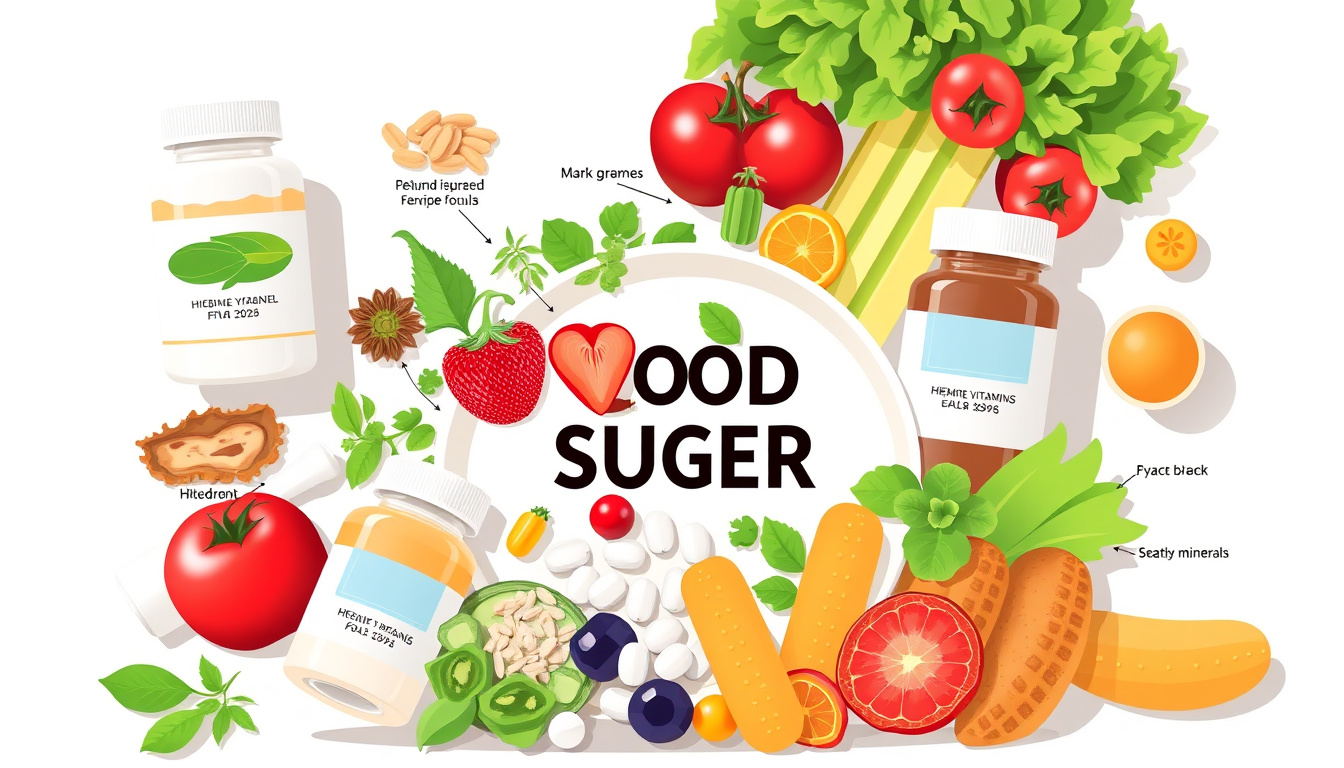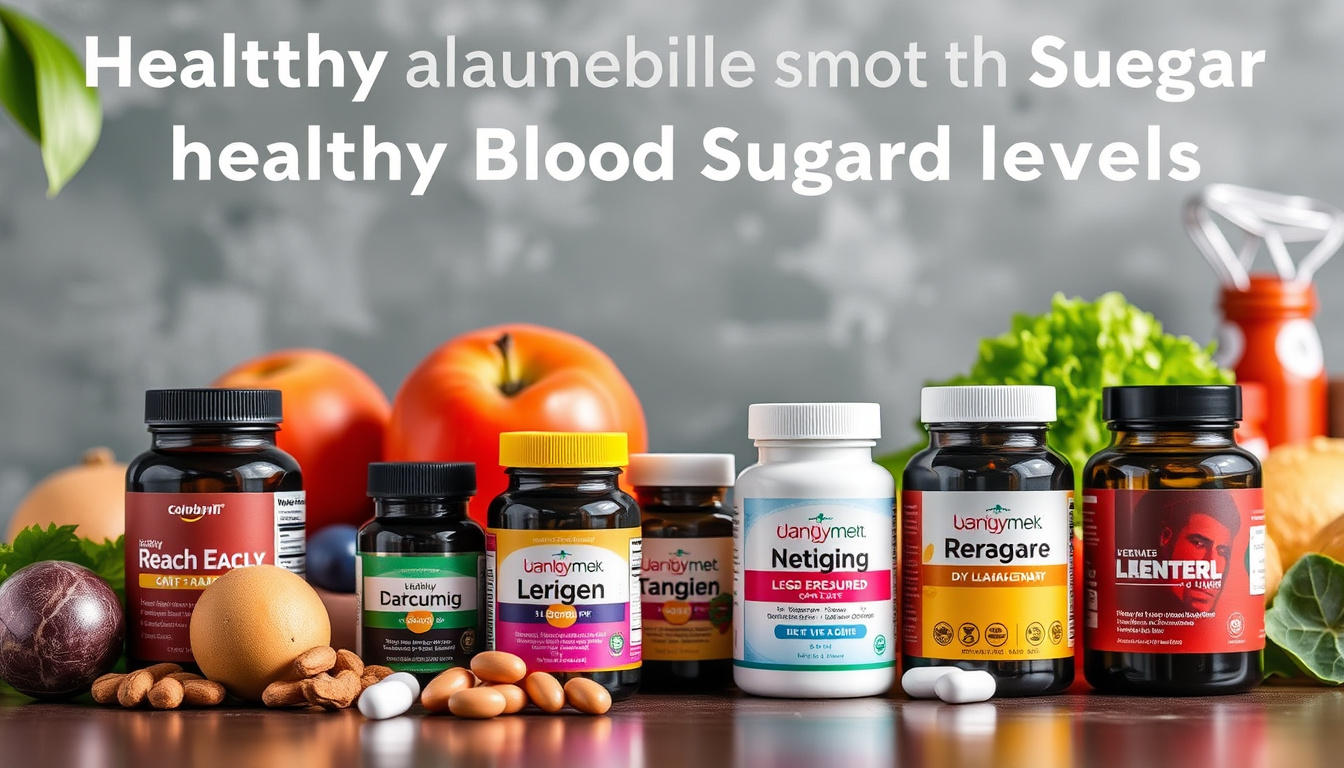Unlock Your Health: The Ultimate Guide to the Best Blood Sugar Supplements for Balanced Living
 Jill Smith
Jill Smith
Maintaining balanced blood sugar levels is a crucial aspect of overall health, especially for individuals with or at risk of type 2 diabetes. While medications and lifestyle changes remain foundational to blood sugar management, certain dietary supplements have gained attention for their potential supportive roles. This guide explores the most researched blood sugar supplements, their benefits, safety considerations, and how they might fit into a balanced health routine.
Understanding Blood Sugar and Its Importance
Blood sugar, or blood glucose, is the main sugar found in your blood and a vital energy source for your body's cells. Diabetes occurs when your body can't manage blood sugar effectively, leading to elevated levels that, over time, may cause complications such as heart disease, nerve damage, and kidney problems.
Balancing blood sugar through diet, exercise, and medical treatment is essential. Some supplements might complement these efforts, but they should never replace prescribed therapies.
Top Blood Sugar Supplements Backed by Research
Here is an overview of supplements with evidence suggesting potential blood sugar benefits:
1. Cinnamon
Cinnamon supplements, often derived from Cinnamomum cassia or Cinnamomum zeylanicum, might improve insulin sensitivity and help lower fasting blood sugar levels. Meta-analyses show mixed results; some report significant reductions in fasting glucose, while others find little change in long-term markers like HbA1c. Caution is advised with Cassia cinnamon due to coumarin, a compound that may damage the liver in high doses.
2. Berberine
Berberine is a bioactive compound extracted from plants like goldenseal and barberry. Multiple studies indicate berberine can reduce fasting blood glucose and improve insulin resistance. It may also help lipid metabolism. Side effects include digestive upset, and it can interact with certain medications, so medical consultation is important before use.
3. Alpha-Lipoic Acid (ALA)
ALA is a vitamin-like antioxidant that may help reduce oxidative stress associated with high blood sugar. It shows promise in reducing symptoms of diabetic neuropathy, though evidence on its impact on blood sugar control is inconsistent. Side effects may include headache and digestive discomfort.
4. Magnesium
Magnesium deficiency is common in people with type 2 diabetes and may worsen insulin resistance. Supplementation has been linked to improved fasting blood sugar and cardiovascular markers. Magnesium interacts with some drugs, such as diuretics, so coordination with a healthcare provider is recommended.
5. Vitamin D
Low vitamin D levels are associated with increased risk of diabetes. Supplementing vitamin D might enhance insulin production and action. Though generally safe, vitamin D supplements may interact with certain medications, necessitating medical advice.
6. Gymnema Sylvestre
An herb traditionally used in Ayurveda, Gymnema may reduce sugar absorption in the gut and lower fasting blood glucose. It can enhance insulin effects, so individuals on insulin therapy should use it under medical supervision.
7. Probiotics
Supporting a healthy gut microbiome with probiotics may improve carbohydrate metabolism and blood sugar control. Most people tolerate probiotics well, but those with severely weakened immune systems should proceed cautiously.
8. Ginseng
Ginseng may lower post-meal blood sugar spikes. However, it can interfere with blood thinners and immunosuppressants, so medical advice is necessary before starting supplementation.
9. Aloe Vera
Extracts or juices from aloe vera leaves might reduce fasting blood sugar in prediabetes and diabetes cases. Aloe can interact with medications like digoxin and should be used with caution.
10. Chromium
Chromium supports insulin action and carbohydrate metabolism. Although it may improve blood sugar control, antacids and other drugs can hamper its absorption. Its efficacy is still under investigation.
Safety and Precautions
- Consult Healthcare Providers: Always discuss any supplement use with your doctor, especially if you take blood sugar-lowering medications, to avoid hypoglycemia or harmful interactions.
- Quality of Supplements: Supplements are not regulated with the same rigor as pharmaceuticals; choose reputable brands and be wary of exaggerated claims such as “natural diabetes cures.”
- Possible Side Effects: Though generally safe, supplements can cause side effects ranging from gastrointestinal issues to allergic reactions.

Integrating Supplements Into a Balanced Lifestyle
Effective blood sugar management is multifaceted. Supplements may serve as supportive tools but are best paired with:
- Healthy Diet: Emphasize whole grains, vegetables, lean proteins, and limit processed foods and sugars.
- Regular Physical Activity: Exercise improves insulin sensitivity and promotes glucose regulation.
- Stress Management and Sleep: Both impact blood sugar balance.
- Medication Adherence: Supplements are complementary, not replacements for prescribed treatments.
Conclusion
Numerous supplements—such as cinnamon, berberine, alpha-lipoic acid, magnesium, and vitamin D—show potential for supporting blood sugar regulation. However, more extensive and long-term research is needed to fully confirm their benefits and optimal usage.
Prioritize safety by consulting healthcare professionals before adding supplements to your regimen. Combined with healthy lifestyle choices and medical care, supplements can be a valuable part of balanced living aimed at maintaining healthy blood sugar levels.
References:
- Healthline, "10 Supplements That May Help Lower Blood Sugar," 2025
- Veterans Affairs Whole Health Library, "Supplements to Lower Blood Sugar"
- National Center for Complementary and Integrative Health (NCCIH), "Diabetes and Dietary Supplements: What You Need to Know"
This guide is for informational purposes only and is not a substitute for professional medical advice.
Turn Back the Clock: Unlock the Secrets to Reverse Diabetes in 30 Days. Don't Wait! Download Now
Subscribe to my newsletter
Read articles from Jill Smith directly inside your inbox. Subscribe to the newsletter, and don't miss out.
Written by
